The following is a sermon preached on August 2, 2020 at Harpeth Christian Church in Franklin, Tennessee. You can listen to it on the HIM Publications podcast here or watch it on YouTube here.
Follow with me the story of Jacob and Esau from a 40,000-foot view for an important lesson about reconciliation. As we take this mental flight, we’re going to touch down at three pivotal moments in their lives, from Genesis 25–33. We will begin when they are still young men living at home and then again when they are older with families of their own.
From the very beginning, these brothers were at odds, because even when they were born, Jacob was grabbing Esau’s heel. In fact, Jacob’s name sounds like the Hebrew word for “heel” and would have connoted that he was a “trickster,” and Esau’s name sounded like the Hebrew word for “hairy.” So, Jacob and Esau are really more like Heel and Hairy!
If there was a banner flying over Jacob and Esau’s relationship, it would have had the word “Struggle” written across it. But as we’ll see, struggle is not the last word in their story.

Their struggle manifests when Jacob stole two significant things from Esau:
1. Jacob stole Esau’s birthright.
The first is when Jacob takes Esau’s birthright in Genesis 25:29–34. As the story goes, Esau had been away on a hunting trip, and he came back to find a freshly cooked meal by Jacob. He was so desperate for food that he let Jacob manipulate him, so Esau sold his extra portion of inheritance to Jacob.
2. Jacob stole Esau’s blessing.
The second pivotal moment in their sibling rivalry happened when Jacob stole Esau’s blessing in Genesis 27. We see this unfold in one of the most painful narratives of Scripture. Isaac wants to bless the oldest son, Esau, but Rebekah convinces her favorite son, Jacob, to steal it.
Can you believe that? I sometimes wonder at the patience of God that he works with us people at all.
Jacob dresses up like his brother Esau and steals his blessing from their father Isaac.
Notice a crucial moment in Genesis 27:22–24, 36 (NIV):
Jacob went close to his father Isaac, who touched him and said, “The voice is the voice of Jacob, but the hands are the hands of Esau.” He did not recognize him, for his hands were hairy like those of his brother Esau; so he blessed him. “Are you really my son Esau?” he asked. “I am,” he replied.”
Esau was devastated when he found out and said, “Isn’t he rightly named Jacob? He has deceived me these two times: He took my birthright, and now he’s taken my blessing!” Then he asked, “Haven’t you reserved any blessing for me?”
Jacob and Esau had massive conflict in their lives, to say the least.
What we’re seeing in the world today, during this unique cultural moment, is massive conflict at every turn. We’re seeing political, national, and even local conflict over pretty much everything. There’s conflict in our families and even within ourselves.
The Conflict Spiral
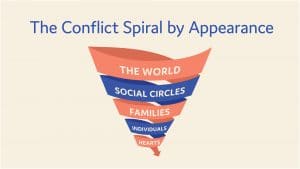
Here’s the narrative the world is telling, what we’ll call “The Conflict Spiral.” They say that the real problem is:
- The world presses down on people.
- Social circles are impacted.
- Families are affected.
- Individuals are harmed.
- We experience turmoil in our hearts.
There’s truth to that. But that doesn’t get to the heart of it.
The reality is that what really causes fights between countries, states, spouses, siblings, and even friends are all the same: they all come from disordered desires within our own hearts. That’s why James 4:1–2 says:
What causes fights and quarrels among you? Don’t they come from your desires that battle within you? You want something but don’t get it. You kill and covet, but you cannot have what you want. You quarrel and fight. You do not have, because you do not ask God.
The problem is not just in the world; it’s in us, too.
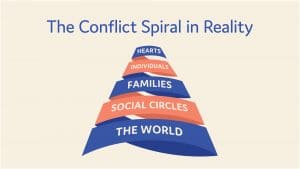
So, while the world tells one narrative, the reality is a fuller picture, which is flipped. The truth is that “The Conflict Spiral” really goes the opposite way:
- We experience turmoil in our hearts … because we don’t get what we want.
- Individuals are harmed … because we take it out on others.
- Families are affected … because they are the closest to us.
- Social circles are impacted … because we live social lives.
- The world presses down on people … because when you add us all together, we’re one big mess.
We all need redemption, and the transformation of individuals at the heart level is how real change happens—and that comes only by God.
All the conflicts happening between people right now stem from sin. It’s not about the conflicts or the issues themselves. It all comes from the fact that every one of us is lost and in desperate need of an encounter with the living God.
Our real problem is not fighting on the outside; it’s the battle within.
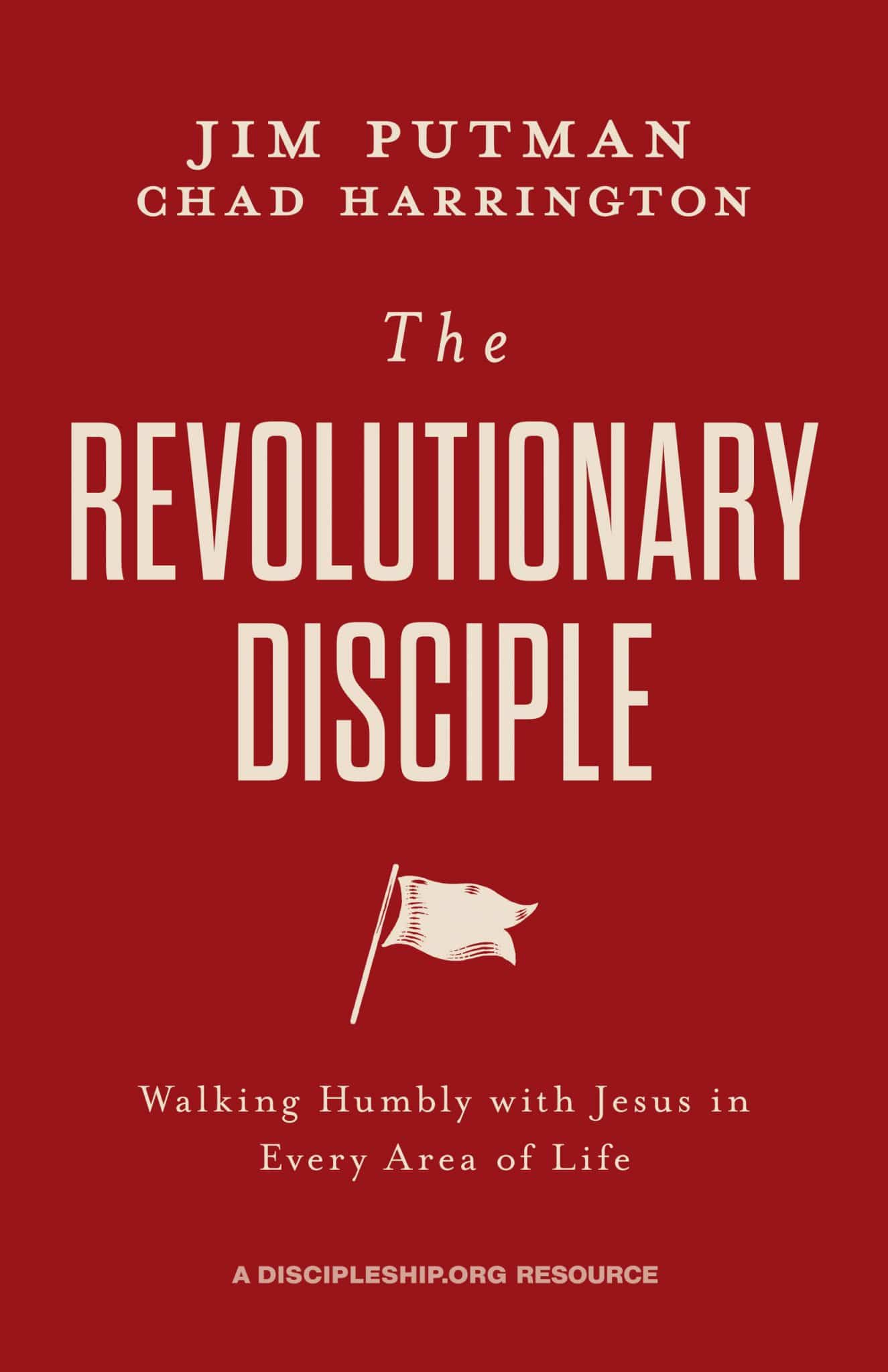
Jim Putman’s The Revolutionary Disciple
Walking Humbly with Jesus in Every Area of Life
A comprehensive discipleship strategy for your home, work, and church. You’ll benefit greatly from reading this book with your discipleship group or church staff.
— Robby Gallaty, pastor and author of Replicate
A long overdue call to us as leaders to humble ourselves before the Lord and the people we lead.
— Ed Litton, pastor and president of the Southern Baptist ConventionGet Product
Our Need for Reconciliation
What we see in the life of Jacob and Esau is a microcosm of all sorts of conflict, and so when we read their story, we should see ourselves in the narrative.
Like these two brothers, we need God in order to be made whole, which affects our relationships with everyone else.
The main point of my message today, if you could walk away with one thing, is this:
In order to be reconciled with one another, we must encounter God in a transformational way.
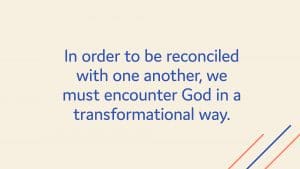
That’s what we all need, and that’s what Jacob and Esau needed.
Jacob and Esau’s Journey
As the story unfolds for Jacob after he steals his brother’s blessing, Jacob ends up essentially running away from home so that his brother Esau wouldn’t kill him.
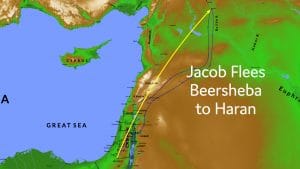
According to Genesis 26:23, Isaac and his family had settled in Beersheba, which was near the southern border of Judah. So, when Jacob fled, he went from Beersheba all the way to Haran, where Rebekah, his mother, had come from.
Then, he spent the next twenty years there. What started as a trick turned into two decades of hard labor, where he learned what it meant to be tricked: His father-in-law tricked him into marrying Leah after seven years of hard labor, when he only wanted to marry Rachel. So, he had to work another seven years. Then, for an additional six years, he worked for his father-in-law—his father-in-law changing his wages ten times. Talk about learning a lesson!
Jacob was being humbled.
Let’s pick up the narrative those twenty years later, when God tells him to return to his homeland, which is all the way back to the southern border of Canaan.
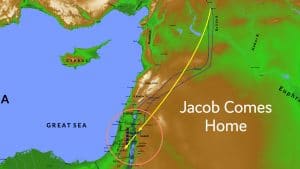
He had somehow learned that his brother Esau lived in a neighboring region, Seir, and that was a threat to him. So, Jacob sent out scouts to assess the situation.
Then, Esau caught wind of his brother’s return, and started pursuing Jacob.
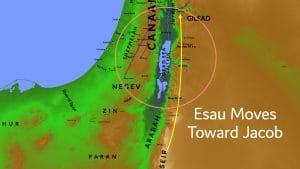
Jacob’s scouts came back and said, “We went to your brother Esau, and now he is coming to meet you, and four hundred men are with him” (Gen. 32:6, NIV). It’s confrontation point.
As a result, Jacob develops his defense strategy. First, he divides his family into two groups with flocks and herds and camels so that at least one group would survive when they got attacked. Then, he prays:
I am unworthy of all the kindness and faithfulness you have shown your servant. I had only my staff when I crossed this Jordan, but now I have become two groups. Save me, I pray, from the hand of my brother Esau, for I am afraid he will come and attack me…” (Gen. 32:10–11, NIV).
Steps Toward Reconciliation
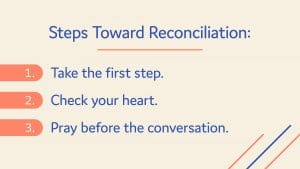
Let me pause a minute and take a step out of the narrative for a practical lesson. Whenever you’re about to encounter someone who has something against you, the posture of Jacob, paired with prayer, is the way to do it. I adapted the following “Steps Toward Reconciliation” from advice I received from a man named Craig Miles:
- Take the first step by deciding to make yourself vulnerable.
- Check your heart to make sure you’re being humble and acknowledging your part.
- Pray before the conversation so that a potential divisive moment would actually be a reconciliation moment.
Jacob Encounters God
So, Jacob prepares all his people and an incredible gift of six different droves of herds: 220 goats, 200 ewe lambs and 20 rams, 30 camels, 50 cows, and 30 donkeys. His plan was to send all these spaced out one after the other for dramatic effect, then he divided all the people into groups, and last he would come at the end, planning to literally bow down seven times. That was his plan, hoping it would keep Esau from killing him.
He sent everyone ahead of him and it says that night: “Jacob was left alone, and a man wrestled with him till daybreak” (Gen. 32:24). We later learn that somehow, Jacob wrestled with God that night. Jacob sought God and encountered God that night before this major moment in his life, and we don’t know many details or exactly how it worked, but we do know this:
God changed Jacob’s life that night.
There’s a lot of mystery to this text for us today, perhaps because it was hard to describe with words. What we can know is that Jacob encountered God in a transformational way.
The man, representing God, touched the socket of Jacob’s hip, which made him walk with a limp afterwards.
Then, God says to him through an angel, and this comes from The Message paraphrase, “Your name is no longer Jacob. From now on it’s Israel (God-Wrestler); you’ve wrestled with God and you’ve come through.” The NRSV and ESV say that he wrestled with God and “prevailed.”
His new name was Israel, which sounds like “wrestle with God” in Hebrew.
So, God essentially changed his identity from Tricker of People to Wrestler with God.
This change affected the history of the world because Jacob became Israel, and Israel became the nation that fulfilled God’s promise to Abraham, Isaac, and now Jacob.
The timing is really important because it says, picking up in Genesis 32:31, that the sun rose and Jacob looked up and saw Esau with his four hundred men.
Jacob Encounters Esau
Jacob follows his plan, sending all the gifts to Esau: 220 goats, 200 ewe lambs and 20 rams, 30 camels, 50 cows, and 30 donkeys. Then, his family divided into two groups, and lastly his dramatic seven rounds of bowing. All in an effort to mitigate the situation. But notice what happens:
“But Esau ran to meet Jacob and embraced him; he threw his arms around his neck and kissed him. And they wept”
(Gen. 33:4, NIV).
What kind of man was Esau that he could forgive like this? We know Jacob’s story of transformation, but what about Esau?
The last time we saw Esau, he wanted to kill Jacob, and now he runs to him, kisses him, and weeps with him. The only thing that can explain this is that he, too, had been transformed by God.
Then, for Jacob, imagine his surprise when he expected to be confronted with a sword but instead received a kiss.

There’s a scene from Episode 2 of the TV series The Chosen I love. Mary Magdalene’s character explains to Nicodemus what happened when she encountered Jesus:
“He called me Mary,” she said. “He told me, I am his, I am redeemed.” Nicodemus pressed her on it and she simply said, “I don’t understand it myself, but here is what I can tell you: I was one way and now I am completely different, and the thing that happened in between was him.”
We don’t always understand how God touches us, but when he does, he reaches down into the depths of our hearts and changes everything.
The Reconciliation Revolution
We talked about “The Conflict Spiral”:
- We experience turmoil in our hearts.
- Individuals are harmed.
- Families are affected.
- Social circles are impacted.
- The world presses down on people.
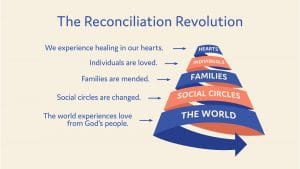
In Christ, though, we get access to “The Reconciliation Revolution,” which is what God can do in us:
- We experience healing in our hearts.
- Individuals are loved.
- Families are mended.
- Social circles are changed.
- The world experiences love from God’s people in a way that’s revolutionary.
While the world experiences life one way, in Christ, we can be transformed, and the thing that happens in between is God. He gives us satisfaction and peace in our hearts, which enables us to give and receive this from others.
The Resolution to Jacob and Esau’s Story
Once Jacob and Esau stopped blubbering over each other, Esau asked Jacob, “What do you mean by all these droves I met?” (Gen. 33:8, NIV).
Still humble, Jacob says, “To find favor in your eyes, my lord” (Gen. 33:8, NIV).
But Esau said, “I have enough, my brother; keep what you have for yourself” (Gen. 33:9, ESV).
Esau said, “I have enough” (Gen. 33:9, ESV).
Can you say, “I have enough?” I’m not talking about money; I’m talking about peace. I struggle with being able to say this one. So, let me tell you a story of a lady who learned to say, “I have enough.”
Reconciliation in Sierra Leone

In 2013, I visited an orphanage in Sierra Leone, and I remember the story of one lady, whom I walked through Neil Anderson’s Steps to Freedom in Christ in a group setting. Part of this process involves taking an inventory of all the people who have wronged you in your life. You list them out and by God’s grace work toward forgiving them.
Toward the end of the week, a lady pulled me aside and told me what God had done in her life that week. She said that during the Sierra Leone civil war, which took place in the 90s and early 2000s, her uncle had stolen her passport in order to sneak out of the country, leaving her without a way to escape. She said, “For ten years, I still have not forgiven him. It has caused conflict in our family for a decade. But today I forgave him for the first time, and I’m actually going to go and reconcile with him.”
She had experienced God, and God’s change in her heart affected her relationships—
In order to be reconciled with one another, we must encounter God in a transformational way.
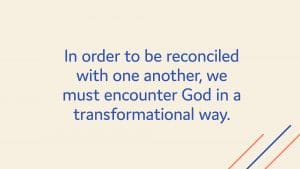
So, let me ask you:
How are you doing in your heart?
With whom do you need to be reconciled?
Whom have you injured?
Does anyone has a grievance against you?
What reconciliation with people do you need today?
In order to be reconciled with one another, we must encounter God in a transformational way.
So, ask God, “Am I right with those close to me?” If there’s unresolved conflict, ask God, “How can I be reconciled to them?”
The apostle Paul wrote, “If it is possible, as far as it depends on you, live at peace with everyone” (Rom. 12:19). You can’t make someone be reconciled to you. Esau played a role, too. All we can do is our part. So, allow God to bring peace in your heart, so that you can make peace with those close to you, as far as it depends on you:
- Take the first step
- Check your heart.
- Pray beforehand.
And maybe this will lead usher in the peace of God, which transcends all understanding, to not only guard our hearts and minds but to also cause a rippling affect in our families, in our nation, and in the world.
Subscribe to HIM Publications here to get blogs like these delivered to your inbox.


Thank you for serving God, also thank you for this beautiful article.
You’re welcome!
This is a beautiful message Thank you
You’re welcome! Thank you
This was an excellent article. May the Lord God bless you and prosper the ministry.
Thank you, KC, for your encouragement and blessing!
Very rich article!
More fire!!
Thank you!
Simple and inspirational. Thank you